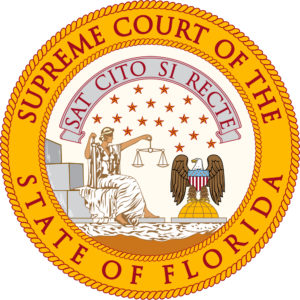Rule Change: Rehearing Required to Preserve Challenge to Sufficiency of Trial Court Findings
 The Florida Supreme Court Friday amended Florida Rule of Civil Procedure 1.530 and Florida Family Law Rules of Civil Procedure 12.530 to expressly require that “To preserve for appeal a challenge to the sufficiency of a trial court’s findings in the final judgment, a party must raise that issue in a motion for rehearing under this rule,” effective immediately upon the issuance of the order on August 25, 2022. See In Re: Amendments to Florida Rule of Civil Procedure 1.530 and Florida Family Law Rule of Procedure 12.530 (Aug. 25, 2022) [official court link]. [Author’s note: There have since been further amendments — check out our follow-up here]. While this is a change to the civil rules, it has a direct and real effect on whether a successful appeal is possible, so it is important for anyone who is considering an appeal to think carefully and act quickly to ensure this appellate issue is preserved by filing a motion for rehearing pursuant to Rule 1.530 or 12.530 within 15 days of rendition of a final judgment. And this means that if you have any interest in appeal, it is urgent that you speak with an appellate lawyer well before that 15 day deadline to ensure that you don’t inadvertently waive the issue on appeal.
The Florida Supreme Court Friday amended Florida Rule of Civil Procedure 1.530 and Florida Family Law Rules of Civil Procedure 12.530 to expressly require that “To preserve for appeal a challenge to the sufficiency of a trial court’s findings in the final judgment, a party must raise that issue in a motion for rehearing under this rule,” effective immediately upon the issuance of the order on August 25, 2022. See In Re: Amendments to Florida Rule of Civil Procedure 1.530 and Florida Family Law Rule of Procedure 12.530 (Aug. 25, 2022) [official court link]. [Author’s note: There have since been further amendments — check out our follow-up here]. While this is a change to the civil rules, it has a direct and real effect on whether a successful appeal is possible, so it is important for anyone who is considering an appeal to think carefully and act quickly to ensure this appellate issue is preserved by filing a motion for rehearing pursuant to Rule 1.530 or 12.530 within 15 days of rendition of a final judgment. And this means that if you have any interest in appeal, it is urgent that you speak with an appellate lawyer well before that 15 day deadline to ensure that you don’t inadvertently waive the issue on appeal.
The Supreme Court was no doubt intending to resolve a split among the District Courts of Appeal regarding whether a motion for rehearing is required in such circumstances. In 2019, the Second District Court of Appeal in Engle v. Engle, 277 So.3d 697 (Fla. 2d DCA 2019) [official court link] held that such a motion for rehearing was not required to preserve an appellate challenge to the adequacy of statutorily required findings of fact, and thus the failure to comply with a statute’s requirement of factual findings “is reversible error regardless of whether a motion for rehearing is filed.” Id. at 699, citing Fox v. Fox, 262 So. 3d 789 (Fla. 4th DCA 2018) (en banc) [official court link]. In Engle, which was a family law case and thus applied Rule 12.530, the court stated that while it would be preferable to allow the trial court the option to fix its mistake prior to appeal, “if a litigant fails to do so for whatever reason, he or she should not be foreclosed from having the error corrected.” The Second District explained that, especially in family law proceedings, “to impose such a procedural constraint on a family law litigant elevates judicial convenience over equity.” Id. at 703. The court described the rehearing motion requirement as a “judicially created…trap” for family law litigants, partiuclarly those acting pro se, and instead placed the burden squarely on trial courts to follow the law in the first instance or be subjected to reversal.
Indeed, both the Second in Engle and the Fourth District in Fox urged the Famly Law Rules Committee to review and address this issue to make this clearer.
The Florida Supreme Court’s amendment is made “on its own motion” and does not come directly from a Family Law Rules Committee proposal. The Court will be accepting comments on the rule through November 8, 2022. So be on the lookout for a potential further change to the process. But for now, make sure you are on top of these important preservation issues.
Here’s the Full Text of the Changes, with additions indicated by underlining:
RULE 1.530. MOTIONS FOR NEW TRIAL AND REHEARING; AMENDMENTS OF JUDGMENTS
(a) Jury and Non-Jury Actions. A new trial may be granted to all or any of the parties and on all or a part of the issues.
To preserve for appeal a challenge to the sufficiency of a trial court’s findings in the final judgment, a party must raise that issue in a motion for rehearing under this rule.
On a motion for a rehearing of matters heard without a jury, including summary judgments, the court may open the judgment if one has been entered, take additional testimony, and enter a new judgment.
(b) – (g) [NO CHANGE]
Committee Notes
[NO CHANGE]
Court Commentary
1984 Amendment. [NO CHANGE]
2022 Amendments.
The amendment to subdivision (a) does not address or affect, by negative implication, any other instance in which a motion for rehearing is or might be necessary to preserve an issue for appellate review
FLORIDA FAMILY LAW RULES OF PROCEDURE
RULE 12.530. MOTIONS FOR NEW TRIAL AND REHEARING; AMENDMENTS OF JUDGMENTS
(a) Jury and Non-Jury Actions. A new trial or rehearing may be granted to all or any of the parties and on all or a part of the issues.
To preserve for appeal a challenge to the sufficiency of a trial court’s findings in the final judgment, a party must raise that issue in a motion for rehearing under this rule.
On a motion for a rehearing of matters heard without a jury, including summary judgments, the court may open the judgment if one has been entered, take additional testimony, and enter a new judgment.
(b) – (h) [NO CHANGE]
Court Commentary
2022 Amendments. The amendment to subdivision (a) does not address or affect, by negative implication, any other instance in which a motion for rehearing is or might be necessary to preserve an issue for appellate review.
Please note: There have been further amendments since we posted this. Be sure to check out our latest post on the amendments to Rule 1.530 and 12.530 here.



